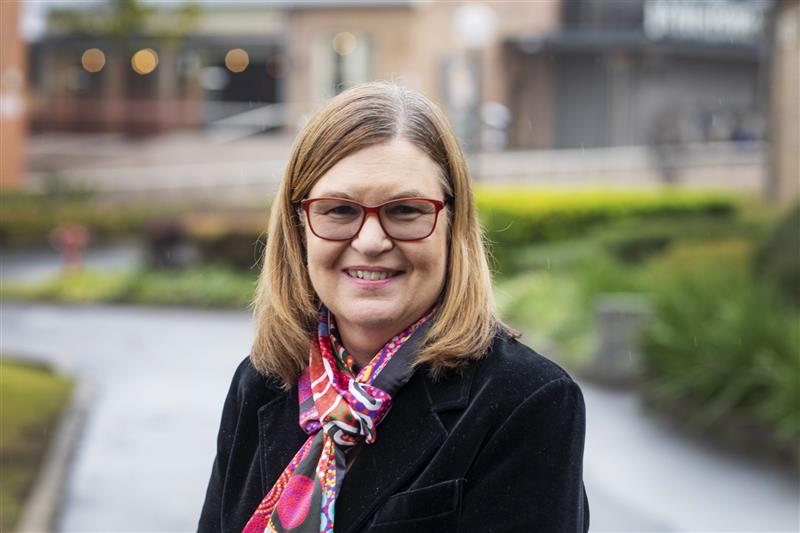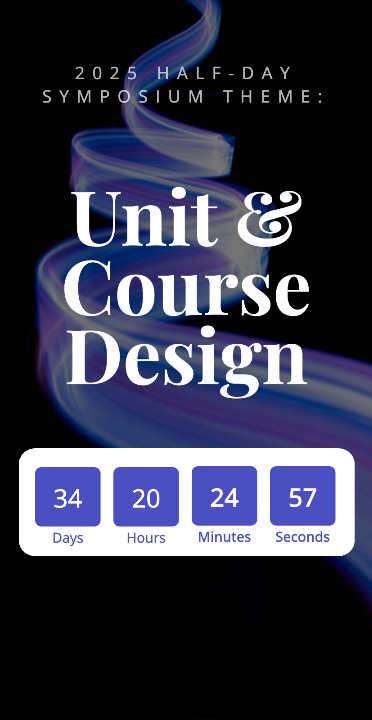Key dates
to add to
your calendar.
Get them in your calendar now.

Register to attend
Don’t miss out on the opportunity to attend this year’s full-day symposium in July.
Register now to secure your place and be part of an inspiring day filled with thought-provoking presentations, networking opportunities, and collaborative discussions.

Feedback survey
Thank you, everyone for attending or participating in our full-day Symposium. We aim to always strive for the best event possible, in light of that, we’d love 2-minutes of your time to provide us with some feedback.
Feedback Survey
Keynote Presenter
Professor Susan Page – Pro Vice-Chancellor Indigenous, Western Sydney University
Professor Susan Page is an Aboriginal Australian educator and leader whose research focuses on Aboriginal and Torres Strait Islander peoples’ experience of learning, academic work and leadership in higher education and student learning in Indigenous Studies. She is currently Pro Vice-Chancellor Indigenous Education at Western Sydney University. Susan has held several leadership positions at Australian universities and is a Principal Fellow of the Higher Education Academy. She has collaborated on multiple competitive research grants, has received a national award for Excellence in Teaching (Neville Bonner Award) and is well published in Indigenous Higher Education. Susan is a member of the executive committee of the Universities Australia Deputy and Pro Vice-Chancellor Indigenous committee and an appointed Indigenous representative for the Universities Australia Deputy Vice Chancellor Academic committee and the Higher Education Standards Panel.
Program
Find below the program for today’s sessions. Click on the “More” button to explore extracts, synopsis, slides, videos (when published) and access individual presentation pages.
Blurb
The spark of Indigenising curriculum began at least three decades ago, lit by searing criticism from Indigenous scholars within the academy highlighting the dearth of Indigenous disciplinary curricula, and fanned by the recognition that university graduates could contribute to improving Indigenous equity. Today there remains a need to ensure that university graduates can contribute to addressing Indigenous socio-economic outcomes. This is unfinished business requiring considerable institutional commitment. In many disciplines, producing graduates with the capacity to work effectively with and for Indigenous Australians will require reinvigorated curricula
orientations to counteract enduring absences and silences. While the Universities Australia first and second Indigenous Strategies have sharpened institutional focus on Indigenising curriculum, many universities remain ill-equipped to succeed in such curriculum transformation. The complexity of the enterprise arises from factors such as the student resistance, widespread educator under-confidence, poor resourcing, and the scarcity of Indigenous staff. This presentation will range across tips for individual classroom teachers, suggestions for program-focused approaches to curriculum development, and the importance of policy alignment. Along the way the presentation will highlight the value of educators taking risks and show how rewards can be part of the process.
Abstract
Transitioning from a career in professional sport to academic teaching highlighted a critical gap: while students enter university with enthusiasm for exercise and sports science, many lack the foundational academic skills required to succeed in a higher education environment. This presentation shares our approach to redesigning the first-year EXSC curriculum to explicitly teach and embed core academic competencies—reading academic literature, researching effectively, writing with structure and clarity, referencing accurately, and presenting with confidence.
Rather than assuming students possess these skills on entry, we built dedicated modules and scaffolded activities that align with assessment tasks and weekly content. Practical strategies such as short-form academic writing tasks, referencing checklists, scaffolded research discussions, and low-stakes presentation practice were introduced to bridge the gap between enthusiasm and academic readiness.
The presentation will reflect on the challenges of re-orienting curriculum from the perspective of a professional coach turned educator and share evidence of increased student confidence, assignment performance, and engagement. Attendees will gain insight into how explicitly teaching academic fundamentals can support first-year student retention and success—without compromising the applied focus of an EXSC degree.
Abstract
(This is a paper published in Learning Letters in 2024, on modelling evidence of authenticity across a curriculum.) One way of viewing cheating is from the perspective of optimisation: producing a result without performing the work. This creates an interesting parallel with computer programming. Programmers want their compilers to optimise their code, invisibly deviating from the instructions to get the same answer with less effort. In assessment, we want to know students did the work. So, we can borrow some techniques from computer programming (“effect tracking”) to model what evidence of learning we expect across a curriculum. i.e. we want to see “Course and Effect”.
Abstract
Interactive learning tools, such as H5P, are increasingly utilised in higher education to enhance student engagement and understanding. Our discipline evaluated student perceptions of H5P activities in Exercise and Sports Science units, focusing on their effectiveness, engagement, and areas for improvement. Survey responses (n=116) revealed that students highly value H5P’s interactivity, quizzes, and concise content, which foster engagement and self-paced learning. Key strengths include the ability to test knowledge immediately, segmented modules, and the variety of teaching mediums, such as interactive videos and drag-and-drop exercises. However, students identified areas for improvement, including excessive text in some activities. Suggestions for enhancement included providing downloadable resources and incorporating more lecturer insights, highlighting the importance of visibility in online learning. Notably, 78% of respondents agreed that H5P activities helped explain concepts better than traditional learning methods, and 71% reported increased confidence in their understanding of unit material. These findings highlight the potential of H5P to transform learning experiences while emphasising the need for iterative improvements to address student concerns. This study contributes to the growing body of research on interactive learning tools and provides actionable insights for educators seeking to optimise digital learning environments.
Abstract
When academics do not have access to a framework for trauma-informed and culturally responsive pedagogy, well-intended teaching can inadvertently create distress and alienation among students leading to attrition. Showcasing an inclusion pedagogy designed to support student engagement, mental health, and wellbeing in higher education, this presentation highlights a suite of initiatives designed to foster inclusive teaching practices and minimises harm for diverse student cohorts.
Key initiatives include a professional learning program for new and existing staff, that comprise self-paced modules which address Universal Design for Learning, Culturally Responsive Pedagogy, Trauma-informed approaches, and a Pedagogy of Care. A targeted marking resource is provided for academic staff which profiles consistent and supportive feedback processes to promote equity and growth for all learners. The Wellbeing Toolkit MyLearn tile for students curates accessible resources to support positive mental health, wellbeing, and access to crisis support.
By embedding inclusive design across core university operations, the project strengthens retention strategies and raises awareness of inclusive pedagogical practices to help prevent unintentional harm. Attendees will gain insight into the benefits of an integrated approach, learn how to access resources, and understand why sustainable, high-quality learning materials are essential to building a resilient academic community.
Abstract
Diversity, Equity and Inclusion: reimagining change opportunities.
Student engagement and retention continue to be a significant focus for the Australian tertiary sector including the University of New England (UNE). At the same time, UNE aims to position itself as a leader in fostering acceptance and inclusion. Indeed, in its most recent document Belonging@UNE Action Plan 2025-2027, UNE embraces the unique opportunity it has “to spearhead our efforts to embed equity, diversity and inclusion (EDI) into our core business”. As university educators, we have identified a perceived disconnect between legislation, policy, guidelines, procedures and the actualities of practice in our broader Community of Practice (COP). Using this document as a springboard and in the context of our role as educators in Initial Teacher Education (ITE), we will explore the implications of this action plan to enact diversity and inclusion in our classrooms. Hence this presentation is a gentle call to action for our wider COP to critically examine current understandings and practices at UNE in relation to these policies. To this end, we reimagine change opportunities by exploring the fundamentals of innovation in promoting EDI through the lens of self-reflective practice.
Abstract
In 2024 my new unit ‘HINQ303/503: Making Museums Digital’ ran for the first time in T3. In this unit, students explore the different ways that museums have interacted with the digital sphere. We look at broader themes such as the idea of digital space as public space, digitisation, and born digital materials, and their main assessment is to curate their own online exhibition. In addition to this, I also ran a two-day optional intensive school in Sydney where we visited some museums and met some of their staff, and, as a group, curated a small exhibition in a day at the UNE Sydney campus using 3D printed copies of ancient artefacts from the UNE Museum of Antiquities. Students collaboratively used the Pedestal3D platform to interact with digital models of the objects, experimented with the 3D prints, conducted research, came up with a theme and design, and curated the final display. In this presentation I detail this process and explore how this opportunity to use digitised UNE assets both in their digital and 3D-printed forms promoted peer-to-peer learning, interdisciplinary thinking, and digital literacy.
Abstract
Fostering deep reflective practice is a crucial component of professional training in health and service professions, yet educators are frequently constrained by the logistic challenges of providing personalised feedback to large cohorts of students. This presentation introduces a teaching innovation designed to meet this challenge: The Skills Practice Agent for RefleCtions (SPARC). SPARC is a generative AI tutor that engages postgraduate psychology students in a Socratic dialogue to deepen their self-awareness and critical evaluation of their practical skills, as a precursor to supervision.
The pedagogical innovation lies in SPARC’s ability to provide a scalable, equitable, and psychologically safe space for facilitating reflective practice. It offers consistent, on-demand support, allowing students to learn at their own pace and allowing educators to work with more nuanced and complex reflections. We will showcase the design and implementation of SPARC, and also provide a live demonstration. SPARC has been trialled in postgraduate psychology units in Trimester 2 2024 and Trimester 1 2025, and has been revised based on feedback and performance. This presentation will share insights from these iterative trials, including an analysis of student usage and feedback, to demonstrate the tool’s utility and impact.
Abstract
The Unit ‘Literacies and Numeracies in Context’ is taught to all pre-service teachers as a requirement from the Department of Education in NSW. The unit examines the literacy and numeracy demands across all subject areas. The subject areas are also referred to as ‘disciplines’. The unit is hence ‘interdisciplinary’ in nature. The first part of the unit is theoretical in nature arming students with a theoretical framework guiding the unit so that they are equipped with the metalanguage to use in the unit. Part 2 of the unit challenges the students to translate the theory into practice. Students are required to use student work samples from their subjects (disciplines) and analyse the work samples for literacy and numeracy.
In the unit, we use ‘topic notes’, lecture slides, lecture recordings and live tutorials.
Interactions with students happen in the Learning Area Discussion Forums created to cover the various disciplines in the unit. Peer discussions and interactions with the lecturers take place in Forums created to address issues that students may have in the unit. There are three assessments in the unit. Assessment 1 covers the theoretical bit of the unit. Assessment 2 addresses forum discussions and online quizzes. Assessment 3 is a teaching portfolio.
Abstract
We will present a six-stage roadmap for student engagement and preparation.
Abstract
The “Detective” metaphor adopted in SOCY 313/513 invites leaners to tap into their favourite detective’s mind-set as a tool for critical inquiry. It provides a conceptual link to critical pedagogy and reflective practice, encouraging learners to examine societal structures and reflect on their own positionality, to deepen understanding and response. The detective’s mindset, characterised by curiosity, rationalism, rigour and interpretive acuity, supports purposeful learning by scaffolding between lower and higher order thinking.
Conference organising committee
We’re doing 3 Symposia this year!
This is our second one of the year, but we’ve got more planned. Have a look at the other themes to come!




